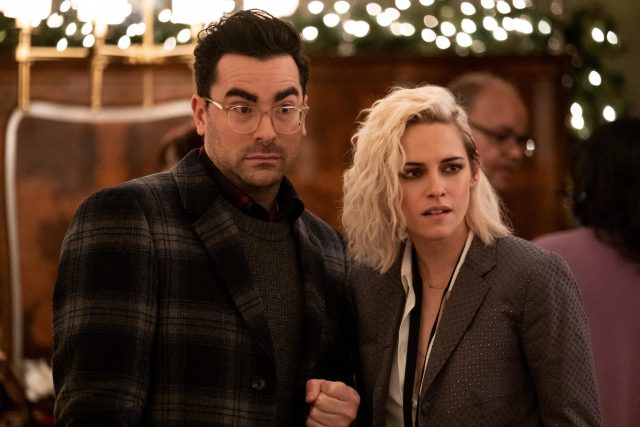Happiest Season: Join the Chorus, by David Bax

Gathering the coolest ladies you know both in front of (Kristen Stewart and Mackenzie Davis) and behind (Clea DuVall) the camera and filling out nearly every supporting role with a cast member from a beloved 2010s sitcom, from Schitt’s Creek‘s Dan Levy to Community‘s Alison Brie to Parks and Recreation‘s Aubrey Plaza to Crazy Ex-Girlfriend‘s Burl Moseley–even The Last Man on Earth‘s Mary Steenburgen, if that’s how you want to think of her–Happiest Season has been poised to be white millennial Twitter’s new favorite Christmas movie for months. Expectations are high, which makes it overjoying to find that the movie lives up to them.
Harper (Davis) and Abby (Stewart) are a happily cohabitating Pittsburgh couple. Harper loves Christmas; Abby’s indifferent. To win her over, Harper invites Abby to spend the holiday with her family, who have never met Abby before. Oh and–as Harper waits till nearly the last minute to reveal–they don’t know she’s gay and Abby will have to pretend to be Harper’s platonic friend and roommate.
Harper’s excuse for Abby’s presence at the family’s yuletide traditions doesn’t need much embellishment. Abby has no family of her own, having lost both of her parents when she was just nineteen. That’s not the most obvious source of comedic inspiration but DuVall (both as director and co-writer along with Mary Holland, who plays Harper’s youngest sister) cracks us up and illustrates the uptight aloofness of Harper’s family by having them repeatedly refer to Abby as an “orphan.” It gets funnier every time, as do Abby’s check-ins with her best friend John (Levy), who is not only the film’s hilarious voice of reason but also has his own miniature comedic storyline, which we follow almost solely based on his surroundings each time Abby calls him.
Happiest Season is the rare romantic comedy in which the central couple is already together at the beginning but it has plenty of dramatic heft as well. That’s not apparent up front; Abby gets over her shock and agrees to go along with Harper’s ruse far more quickly than ought to be expected for someone who’s just been lied to and hoodwinked by the person she loves. As things gradually progress through minor humiliations like Abby being asked to take a picture of the whole family, we come to see that DuVall is not sweeping any conflict under the rug but rather allowing the hurt to build beneath the surface for maximum, devastating impact. We understand the awfulness of what Harper is doing to Abby and how divinely patient Abby is being with her. But, thanks to the Davis’ magnificent performance, we also understand her love for Abby and how hard the situation is on her too.
It’s likely that these nuances will be more immediately understood by LGBTQIA+ viewers than those like me who have neither endured nor inflicted the pain both Abby and Harper are feeling. The lesbian love story at its center may, by definition, make Happiest Season a “nontraditional” Christmas story but the warm holiday glow of its presentation–right down to the cutesy Christmas card opening titles that catch us up on Abby and Harper’s relationship so far–is purely classical. That (very well-crafted) mainstreamness is what makes this one of those quietly monumental movies that make it clear we don’t have to reinvent the wheel to fit queer people into our stories. They’re already there.
Happiest Season is so generous, so funny and so deeply felt that it is destined for a regular place in the culture’s December movie rotation, especially for those who love a good happy-cry. A portion of the tears it jerks this year, though, will likely be from holiday gathering FOMO.






























